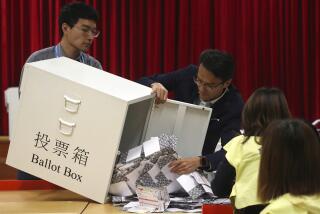Hong Kong Leader Offers No Timetable for Planned Reforms
- Share via
HONG KONG — Chief Executive Tung Chee-hwa failed to set out a much-anticipated timetable for democratic reform during his annual policy address Wednesday and instead announced a task force to consult with Beijing legal experts on the issue.
During his speech to the territory’s Legislative Council and at a news conference afterward, Tung said the decision to consult with the central government came at the insistence of Chinese President Hu Jintao during a meeting last month.
“President Hu told me he was very concerned about this,” Tung told reporters, who grilled him on the issue after the speech. Tung said the consultation with Beijing was needed to clarify several “technical and legal issues” before any move was taken toward broadening the limited democratic rights Hong Kong enjoys as a semiautonomous special administrative region of China.
“There are issues of principle and law that are not clear,” he said. “If they are not clear, how can you move forward?”
Pro-democracy activists were angered by the remarks.
“I hadn’t expected much, but this is even worse than my very low expectations,” said Audrey Eu, an independent member of Hong Kong’s Legislative Council and a prominent voice for political reform. “This is a clear message that nothing can be done unless there is a green light from Beijing. I’m appalled by his policy address.”
Independent analysts had similar reactions.
“In terms of political reform, the policy address is a failure,” said Hong Kong University political scientist Sonny Lo. He predicted the move would add to public discontent over Tung’s performance and increase activity among political opponents pressing for change.
Pressure to broaden voting rights to include the direct election of both the chief executive and all 60 members of the Legislative Council has steadily grown in the months since half a million pro-democracy advocates filled the streets July 1 in a rally that helped defeat a Beijing-backed anti-subversion bill. On New Year’s Day, tens of thousands turned out to call for greater democracy.
In the fall, Constitutional Affairs Secretary Stephen Lam pledged to set out a timetable by the end of last year for achieving those voting reforms by 2007. Wednesday, however, he made it clear that Hu had preempted that idea.
“Originally, we had planned to have a timetable ready in December, but then we had this new development,” Lam said. “The central government wanted discussions first.”
Tung was reelected in 2002 by a committee of 800 carefully vetted members of the territory’s elite. In elections scheduled for September, half the legislative seats -- up from 24 -- will be filled by direct popular vote and half will be appointed. Under the terms of the territory’s return from British to Chinese rule in 1997, direct elections are considered a goal, but there is a 10-year moratorium on constitutional change.
One of the issues Beijing apparently wants clarified is whether reforms completed by 2007 would apply to the chief executive’s election scheduled for that year or if they would become valid only for the following election, in 2112.
Eu said that in light of Wednesday’s developments, reform advocates would push ahead with a voter registration drive and work to make direct election of the chief executive the central issue in September’s legislative vote.
Chief Secretary for Administration Donald Tsang, whom Tung appointed to head the task force, insisted Wednesday that the consultation demanded by Beijing did not preclude the possibility of completing the reforms by 2007. “We have three years,” he said. “There is enough time for us to decide on the best way to move forward and pass a law.”
But the manner in which Tung delivered his remarks on the issue, as much as the content, indicated little enthusiasm for pushing for such a timetable. Although Tung said in his speech that new measures were needed to “get closer to the people and respond more vigorously to the aspirations of the people,” constitutional reform was the last of nine steps mentioned to improve governance.
In a speech lasting more than an hour, Tung devoted three minutes to the topic.
More to Read
Sign up for Essential California
The most important California stories and recommendations in your inbox every morning.
You may occasionally receive promotional content from the Los Angeles Times.









